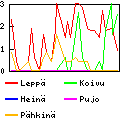From How Far to Watch TV?
Traduction: [ Google | Babelfish ]
Catégories : [ Science ]
The distance l from the TV depends on the desired horizontal viewing angle a, the screen's diagonal d and the number N of pixels on a row. Additionally, we will assume the screen's aspect ratio r to be 16:9 and the human eye's smallest angle that can be seen e to be 31.5 arcseconds.
Let R be the ratio between the diagonal and the width of the screen:
R = √(1 + 1/r2)
We can then write a relationship between a, N and e:
tan(a / 2) = NR tan(e / 2) (1)
From (1) we can deduce that for any given e, there is a maximum horizontal viewing angle amax above which pixels can theoretically be distinguished.
For N = 1920 (FullHD), amax = 19.1°. With a 4K screen, amax = 37.2°.
We can also write a relationship between horizontal viewing angle, screen diagonal and distance:
d / l = 2 R tan(a / 2) (2)
The ideal value or a is a matter of debate, but THX defines a horizontal viewing angle of at least 36° (the screen viewed from the rear seat of a THX theatre), while SMPTE suggests 30°. A value of 20° is also mentioned.
With a 4K screen, amax = 37.2° and (2), we draw that the ideal distance is 1.30 times the screen's diagonal. For example:
- 132 cm for a 40" screen
- 165 cm for a 50" screen
- 197 cm for a 60" screen
With a = 30°, the ideal screen distance is 1.63 times the screen's diagonal. For example:
- 132 cm for a 32" screen
- 166 cm for a 40" screen
- 207 cm for a 50" screen
- 248 cm for a 60" screen
With a FullHD screen and a compromise angle a = 20°, the ideal distance is 2.47 times the screen diagonal. For example:
- 201 cm for a 32" screen
- 251 cm for a 40" screen
- 314 cm for a 50" screen
EDIT: The value of e is valid for a high contrast between two pixels. Most images do not have such a high contrast, and therefore a value of e = 1 arcminute is a reasonnable assumption in practice.
From this follows that for N = 1920 (FullHD), amax = 35.5° (1.36 times the screen diagonal). With a 4K screen, amax = 65.3° (0.68 times the screen diagonal). This also gives a reasonnable value for standard definition PAL TV with N = 1024, amax = 19.4° (2.55 times the screen diagonal).
That would allow for larger horizonat viewing angles, such as 45° (1.05 times the screen diagonal) or 60° (0.75 times the screen diagonal) when viewing a 4K screen. At such short distances one must however take into account the possible lack of comfort due to the physical closeness of smaller screens.
[ Posté le 18 février 2018 à 18:41 | pas de commentaire | lien permanent ]






